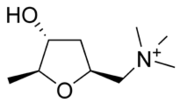
Trimethyl ammonium compounds
Encyclopedia




Quaternary ammonium cation
Quaternary ammonium cations, also known as quats, are positively charged polyatomic ions of the structure NR4+, R being an alkyl group or an aryl group. Unlike the ammonium ion and the primary, secondary, or tertiary ammonium cations, the quaternary ammonium cations are permanently charged,...
compound with three methyl groups at the nitrogen
Nitrogen
Nitrogen is a chemical element that has the symbol N, atomic number of 7 and atomic mass 14.00674 u. Elemental nitrogen is a colorless, odorless, tasteless, and mostly inert diatomic gas at standard conditions, constituting 78.08% by volume of Earth's atmosphere...
, with a more complicated carbon chain derivative at the fourth position.
Examples include:
- Betaine
- BethanecholBethanecholBethanechol is a parasympathomimetic choline carbamate that selectively stimulates muscarinic receptors without any effect on nicotinic receptors. Unlike acetylcholine, bethanechol is not hydrolyzed by cholinesterase and will therefore have a long duration of action. Bethanechol does not involve...
- CarnitineCarnitineCarnitine is a quaternary ammonium compound biosynthesized from the amino acids lysine and methionine. In living cells, it is required for the transport of fatty acids from the cytosol into the mitochondria during the breakdown of lipids for the generation of metabolic energy. It is widely...
and its derivatives - CholineCholineCholine is a water-soluble essential nutrient. It is usually grouped within the B-complex vitamins. Choline generally refers to the various quaternary ammonium salts containing the N,N,N-trimethylethanolammonium cation....
and its derivatives - Methacholine
- MuscarineMuscarineMuscarine, L--muscarine, or muscarin is a natural product found in certain mushrooms, particularly in Inocybe and Clitocybe species, such as the deadly C. dealbata. Mushrooms in the genera Entoloma and Mycena have also been found to contain levels of muscarine which can be dangerous if ingested...
- TrimethylglycineTrimethylglycineTrimethylglycine is an organic compound that occurs in plants as either glycine betaine or a choline-containing glycine betaine compound. Trimethylglycine was the first betaine discovered by science; originally it was simply called betaine because, in the 19th century, it was discovered in sugar...

